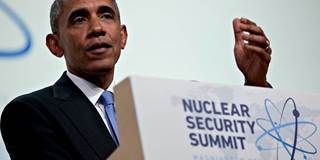The Nuclear Security Summit process, which concluded earlier this month in Washington, DC, shows what can be achieved when political leaders come together to concentrate on a global problem. Unfortunately, however, the nuclear threat is still far from being neutralized.
WASHINGTON, DC – The Nuclear Security Summit process, which concluded earlier this month in Washington, DC, shows what can be achieved when political leaders come together to concentrate on a global problem. The six-year initiative, focused on preventing nuclear terrorism, produced important outcomes on eliminating, minimizing, and securing dangerous nuclear and radiological materials.

WASHINGTON, DC – The Nuclear Security Summit process, which concluded earlier this month in Washington, DC, shows what can be achieved when political leaders come together to concentrate on a global problem. The six-year initiative, focused on preventing nuclear terrorism, produced important outcomes on eliminating, minimizing, and securing dangerous nuclear and radiological materials.